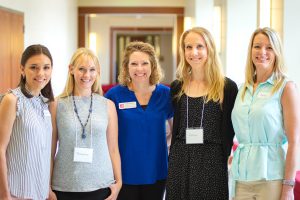One second.
That’s all it takes to drastically alter the life of someone who sustains a traumatic brain injury, also known as a TBI. And while the majority of the focus is on the individual who suffers the injury, the ramifications also affect their loved ones who have to quickly become caregivers.

The University of Alabama recently partnered with the Alabama Head Injury Foundation to conduct the Bright Ideas TBI Camp for 10 traumatic brain injury survivors and their caregivers. The three-day camp, held at the University, allowed UA students studying the fields of social work, music therapy and nursing, among others, to introduce new compensatory strategies to help participants adjust emotionally, cognitively and physically to their “new normal.”
Of those students, four who are enrolled in the distance master’s program in nutrition came to Tuscaloosa to provide individualized nutrition plans for survivors.
“Many brain injury survivors rely on caregivers for an extended period of time following their injury,” said Dr. Joy Douglas, assistant professor in the department of human nutrition and hospitality management at UA. “However, many survivors do not have access to a registered dietitian after they leave the hospital and return home. The camp provided a perfect opportunity for our students to learn more about a unique patient population while also providing valuable services and giving back to the community.”
The distance learning students who participated in the camp were Jackie Kirchner, of Rockford, Illinois; Aimee McDonough, of Enterprise; Babette Myers, of Baton Rouge, Louisiana; and Hannah Perry, of North Little Rock, Arkansas.
McDonough felt an immediate connection to camp participants because of her familiarity with traumatic brain injuries. McDonough’s husband, a former Army helicopter pilot, sustained a concussion while in combat. In addition, her daughter suffered a concussion over a year ago. These experiences, along with once being a dietetic intern in the TBI unit at the Minneapolis VA Healthcare System, led her to take part in the camp.
“TBIs are called a silent injury because you sometimes can’t see the physical effects,” said McDonough. “They make you more aware of a person’s limitations that you may not know about.”
The students provided a lunch-and-learn presentation on the basics of nutrition on the first day of camp. The following two days were spent meeting one-on-one with survivors and caregivers to develop individualized nutrition plans.
According to Douglas, survivors may experience a number of nutrition-related changes following their injury. While some may lose weight and muscle mass due to poor appetite, others may gain too much weight due to limited mobility. She also says that some survivors may experience gastrointestinal side effects from their medications.
“Because every survivor is unique, their nutrition plan of care is also unique,” said Douglas.
Aside from providing nutrition plans to participants, the camp gave the distance learning students a chance to visit the UA campus. For Kirchner and Perry, the visit to Tuscaloosa was their first.
“Getting the opportunity to visit UA and attend camp made me feel more connected to the school and my program,” said Kirchner. “I was able to meet some of my professors, take a campus tour and meet other graduate nutrition students.”
The Bright Ideas TBI Camp was the first to be held on the UA campus but organizers plan for it to become an annual event.
